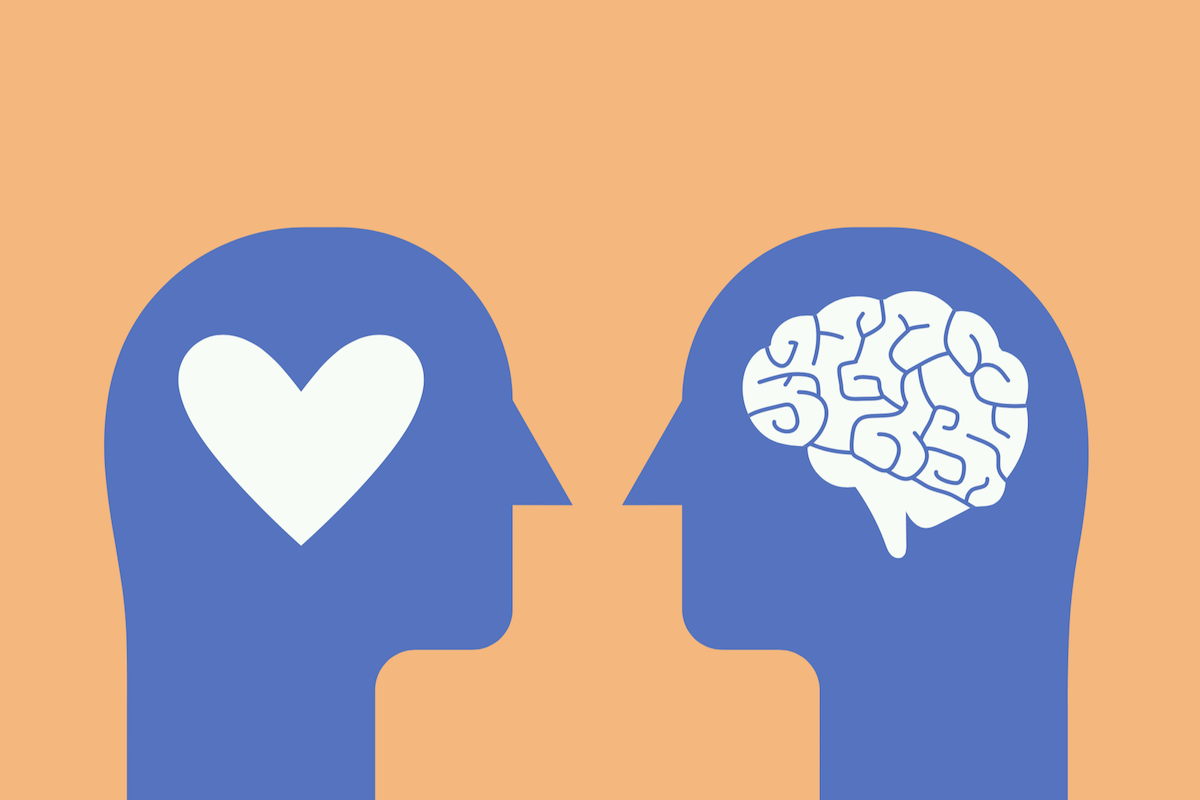Breaking Down The Heart-Mind Connection And What It Means For Your Mental Health

Many people talk about the importance of mental health and wellbeing. But what if we are missing out on the brains’ best friend in this equation?
In the last few decades, efforts have been placed in the treatment and diagnosis of diseases in both areas; cardiology and mental health. The connection between the heart and the brain has, unfortunately, not had sufficient interest from the medical community though.
Through this article, we will understand how the heart’s delicate way of thinking and feeling has been forgotten for many years, as well as exploring the scientific evidence behind mental health and cardiovascular disease and the role of our emotions in diseases of the heart and brain.
More Than A Simple Pump
Modern medicine may have come to overlook the heart as just a simple pump, but in ancient times the view was vastly different.
Take the ancient Greek philosopher Aristotle for example, who in the fourth century BC identified the heart as the most important organ of the body, and the first to form when we are embryos. He saw the heart as the seat of intelligence, emotions, and consciousness, while describing it as the centre of vitality.
The ancient Egyptians were cardiocentrists too. They also believed that the heart was the most important organ in the human body, as well as the only organ associated with the soul and the only one necessary to enter into the next life.

Research by John and Beatrice Lacey in the 1960s and 1970s demonstrated that the heart was not just a simple pump but also an organ of high intelligence, with its own nervous system, decision-making powers, and attachments to the brain.
Then, in 1991, pioneering neuro-cardiology researcher Dr. Andrew Armour made a brilliant discovery. He found that the heart contains 40,000 neurons called sensory neuritis with the capacity of remembering, discerning, and decision-making. This network of neurons is called the intrinsic cardiac nervous system, meaning that the heart has its own nervous system. Intrinsically related is the vagus nerve, which carries information from the heart to the brain, as well as from other internal organs to the brain.
The Heart’s Magnetic Field
Furthermore, the heart also possesses its own pacemaker, an extraordinarily intelligent hub that initiates and controls the cardiac electrical conduction, and has its own electrical conduction, independent from the rest of the body.
Research studies have shown that the heart generates the body’s most powerful and most extensive rhythmic electromagnetic field, which is about 100 times stronger than the brain’s magnetic range. It’s the most potent source of energy in the human body and can be detected from up to three feet away from the body.
The heart has many forms of communicating with its long-time friend, the brain, either biochemically, energetically, or by a complex physiological interaction. There is even evidence that a subtle yet influential electromagnetic or ‘energetic’ communication system operates just below our conscious awareness. Energetic interactions possibly contribute to the ‘magnetic’ attractions or repulsions that occur between individuals, affect our affairs in friendship and love.
In fact, studies done by psychophysiologist Rollin McCraty in 2004, found that one person’s brain waves could synchronize to another person’s heart. Equally, two heart’s will synchronize with each other according to their level of empathy and compassion.
How Your Emotions Play With Your Heart
Research has also shown that different patterns of the heart’s activity (which bring different emotional states) have different effects on cognitive and emotional functions. When we experience stress or negative emotions, the heart enters a level of incoherence, creating erratic and disorganised electromagnetic waves.
These signals are sent to the brain and to other people that we might be interacting with. Our level of coherence significantly affects our decision-making, the quality of our relationships, and the management of our emotions. This helps explain why we may often act impulsively and unwisely when we’re under stress. The heart’s input to the brain during stressful or negative emotions also has a profound effect on the brain’s emotional processes, actually serving to reinforce the emotional experience of stress.
In contrast, the more ordered and stable pattern of the heart’s input to the brain during positive emotional states has the opposite effect; it facilitates cognitive function and reinforces positive feelings and emotional stability. This means that learning to generate increased heart rhythm coherence, by sustaining positive emotions, not only benefits the entire body but also profoundly affects how we perceive, think, feel, perform, act and react in the world.

Can Anger Also Lead To An Unhealthy Heart?
On the flip side to these positive emotions is the idea that more negative thought processes could then have a detrimental effect on your heart. From smoking and obesity, to high cholesterol and a lack of exercise – we’re all fully aware of the risk factors that can lead to coronary artery disease. But can we add anger, hostility, isolation and depression to that list?
Some research studies have suggested that hostility and anger are both precursors of coronary disease, similar to anxiety, stress and inflammation, while those who are angry more frequently are at higher risk for all heart disease events, including heart attack, and bypass surgery. They are also more likely to die suddenly from a heart-related event.
In line with anger-management preventive strategies, some doctors can prescribe Beta-blockers to aid with anxiety and other uncomfortable symptoms such as stress-related palpitations, panic attacks and nervousness. A 2019 study led by Dr Rachel Lampert, Professor of Internal Medicine (Cardiology) at Yale School of Medicine proved that beta-blockers might reduce the triggering effect of anger or stress on atrial fibrillation (AF) by blocking the harmful effects of emotion in those prone to emotion-triggered AF.
And according to Dr Murray A. Mittleman, an associate professor of medicine at Harvard Medical School, anger causes an outpouring of stress hormones like adrenaline, which makes your heart beat faster and your blood pressure rise. Talk about a snowball effect.

Mental Health And Heart Disease: Putting Science First
Furthering the link between the mind and heart, research in the Journal of the American Heart Association, found that persistent depression may double the risk of stroke in adults ages 50 and older. What’s more, recent research in Circulation: Cardiovascular Quality and Outcomes reports that the combination of stress and depression can significantly increase a heart patient’s risk of death or heart attack.
In fact, depression stands besides blood pressure and elevated cholesterol as an independent major risk factor for coronary artery disease.
Many studies have documented a disproportionately high prevalence of depression in patients with coronary artery disease and heart disease relative to the general population. Another concern we face with depression and heart disease is the likelihood of poor adherence to prescribed regimens from doctors, nurses or mental health specialist.
Depression is a two-way road; it affects behavioural risk factors such as smoking, alcohol, diet and nutrition, medical adherence and physical activity. In turn, it impacts on physiological risk factors such as platelet activity, diabetes, obesity and inflammation.
An Inflamed Body And A Moody Mind
Emerging evidence suggests that alterations in immune functioning and inflammation may contribute to the development and clinical manifestations of coronary heart disease. The body’s inflammatory response to chronic hypercholesterolemia and hypertension may contribute to atherosclerosis as damage to the arterial lining occurs over time. There is also evidence showing that increased inflammation is associated with metabolic syndrome, a cluster of conditions that occur together
In my private practice, as a holistic and wellbeing therapist, but also as an arrhythmia specialist nurse with years of experience in cardiovascular health and mental health, I understand that monitoring a heart patient’s mental health is as essential as treating and monitoring a physical condition.

Exploring Some Techniques.
Controlling Your Breath
Knowing the importance of mental wellbeing in cardiac patients, at my cardiac rehabilitation clinic, RhythmiaBreath, we incorporate tools and techniques with a strong focus on education and counselling.
Breathwork is one of the main pillars of our teaching at RhythmiaBreath, with the action playing an essential role in the heart-brain coherence and connection.
When we breathe slowly and rhythmically, you will encourage a shift away from stressful or fearful states into increased coherence, where the heart rate variability increases and the pulse rate slows down.
The heart is also exquisitely sensitive to emotions. An angry or fearful thought changes the way we breathe, our respiratory rate, and the heart-rate variability (HRV) pattern –the variability between each heartbeat, which sets the pace for the brain and respiratory system.
There are many low-paced breathing exercises proven to improve focus and concentration, as well as releasing tension and regulating the nervous system.
The No Medication Approach To Improving The Heart-Brain Connection.
Interventions such as yoga (in the form of therapy), mindfulness, meditation, autogenic relaxation and visualization, specific breathing exercises, and gentle cardiovascular exercise are among the safest options to improve the heart-brain connection alongside regular prescribed medications or treatments by a doctor or healthcare professional.
The guidance of certain mind-body practices, especially those with the potential to trigger emotions attached to negative experiences such as deep meditation or mind-wandering practices must be done under the guidance of a qualified professional. This person should understand both the positive and negative effects of mental practices and the delicate, intrinsic connections and reactions occurring in the brain while practising.
When facilitated by an expert, these practices are beneficial for reducing stress, lowering blood pressure and heart rate, increasing heart rate variability, reducing the harmful effects of an emotional response, and stabilizing the response from the sympathetic and parasympathetic nervous system. They all enhance the quality of life by contributing to a more connected self, and more coherent connection between your heart and your brain.
Sherezade Ruano is the founder of RhythmiaBreath, the first medical well-being programme in the UK to combine modern medicine with holistic practices for the prevention and rehabilitation of cardiovascular disease and mental wellbeing.
She currently combines her role as an arrhythmia specialist nurse at Imperial College NHS Trust, with her private practice as a stress management expert and wellness consultant in central London.


















